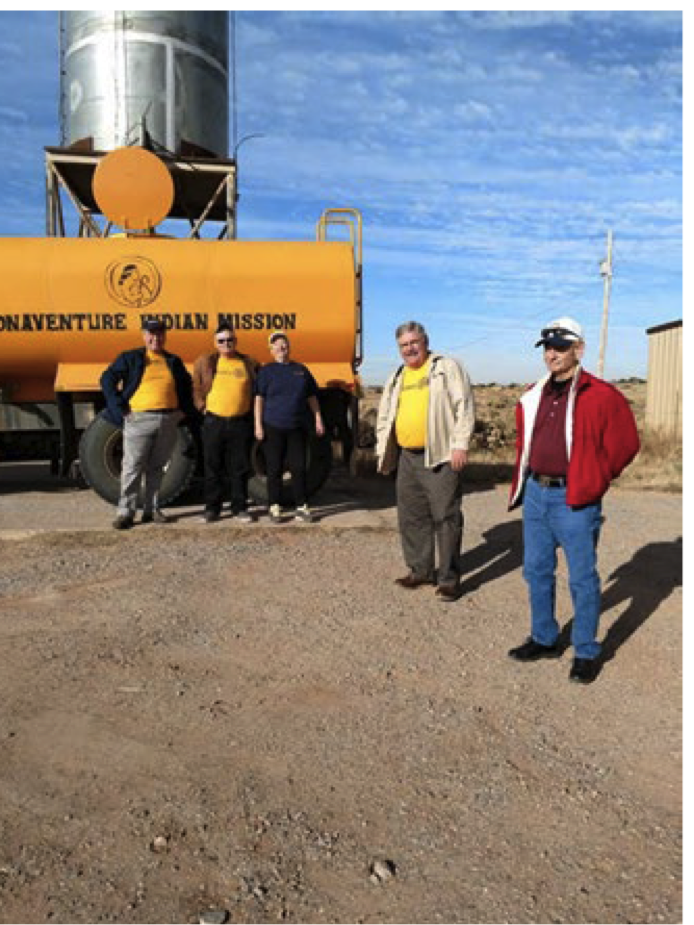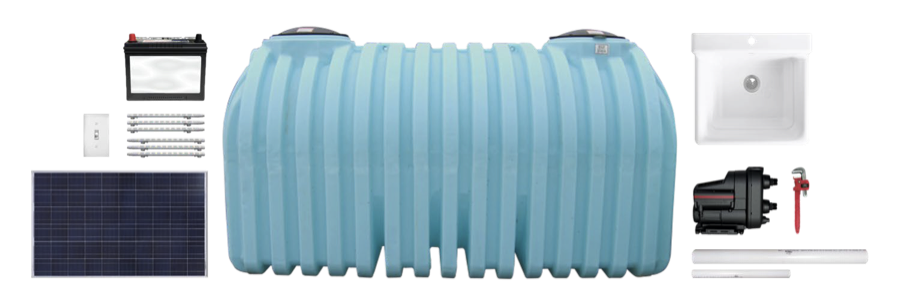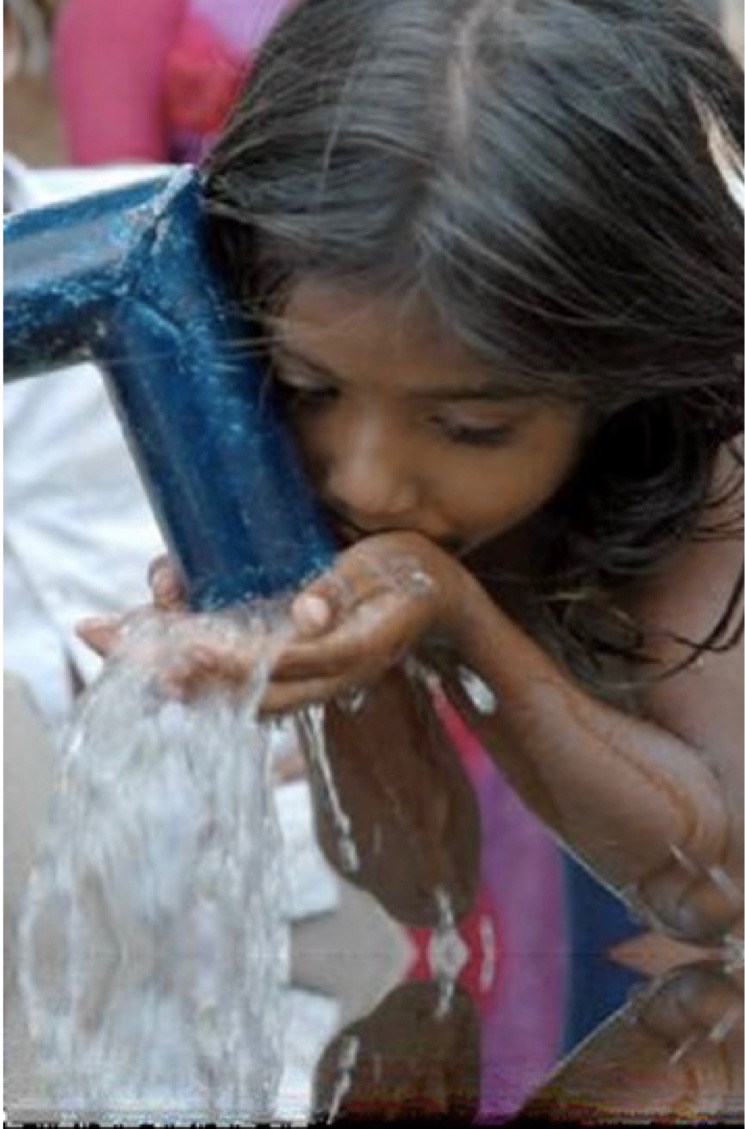 For Navajo families without water and electricity service, there are only a couple of options for water. Those who can afford to buy bottled water, paying a large amount of their monthly income and driving long distances... up to 50 miles round trip for many. Those who can't afford bottled water travel to fill plastic jugs and containers with water. This may provide a household with one to several gallons of water per day. Many families collect water once a month in 50-gallon barrels, but these often aren't cleaned and can contaminate the water. Some haul water from unsafe sources like livestock windmills that can also be contaminated with arsenic, e-coli or uranium. Large barrels must be left outside and are subject to freezing.
For Navajo families without water and electricity service, there are only a couple of options for water. Those who can afford to buy bottled water, paying a large amount of their monthly income and driving long distances... up to 50 miles round trip for many. Those who can't afford bottled water travel to fill plastic jugs and containers with water. This may provide a household with one to several gallons of water per day. Many families collect water once a month in 50-gallon barrels, but these often aren't cleaned and can contaminate the water. Some haul water from unsafe sources like livestock windmills that can also be contaminated with arsenic, e-coli or uranium. Large barrels must be left outside and are subject to freezing.This minimal water supply is used for drinking, cooking and washing hands. Often families use the same gallon of water multiple times (examples: boil pasta, use same water to wash veggies, use same water to wash hair, finally pour spent water in toilet tank). There is not sufficient water for drinking, bathing, cleaning dishes, or other things that a piped water connection makes possible.
The cost of bringing traditional service lines to these Navajo homes scattered in rural areas within the Navajo Nation is prohibitively expensive. Even if there were an effort to build water infrastructure, it would be impractical to maintain (financially and technically) and would be decades away from completion.
It would be great to have your club contribute to project #4. We are collecting club pledges now, but the project will not be submitted for approval to TRF until October or later.
 The new water system that Rotarians are funding with DigDeep, the cooperating organization, is able to provide at least 1200 gallons per household, per month (about 40 gallons a day). That’s roughly 12 gallons or more per person per day on average when accounting for household size. The water is stored in a 1200 gallon underground cistern and pumped into the house using solar power (panel, battery, relay) through a water heater, polishing filter (for taste) and a bladder tank (to maintain pressure) and into a sink. The solar power unit also provides lights and charging ports inside the home. The improvements are clean, hot-and-cold running water of a sufficient amount to meet or exceed daily needs for drinking, bathing, cooking and cleaning. The water is treated and delivered to the home, assuring its quality, and the homeowner no longer needs to spend an exorbitant amount of time or money hauling water from unsafe sources far away.
The new water system that Rotarians are funding with DigDeep, the cooperating organization, is able to provide at least 1200 gallons per household, per month (about 40 gallons a day). That’s roughly 12 gallons or more per person per day on average when accounting for household size. The water is stored in a 1200 gallon underground cistern and pumped into the house using solar power (panel, battery, relay) through a water heater, polishing filter (for taste) and a bladder tank (to maintain pressure) and into a sink. The solar power unit also provides lights and charging ports inside the home. The improvements are clean, hot-and-cold running water of a sufficient amount to meet or exceed daily needs for drinking, bathing, cooking and cleaning. The water is treated and delivered to the home, assuring its quality, and the homeowner no longer needs to spend an exorbitant amount of time or money hauling water from unsafe sources far away.WHY ROTARY?
Although the federal government is legally obligated to assure the availability of safe drinking water to all American Indians and Alaska Natives, it has not done so due to “economic infesibility.” The high elevation of 5,985 feet above sea level, topography and subsoil conditions make establishing a piped water grid nearly impossible. In nearly 50% of the cases where serious water quality deficiencies have been identified, often rural areas which rely on private water sources and have the most serious health issues and highest repair costs, no money is allocated by the government which means that private funding will be necessary to tackle this urgent problem. Despite an estimated cost of $2.7 billion to address serious water and sanitation infrastructure issues in all eligible homes on Native American reservations, Congress appropriated only 4% of that amount in 2016. The total budget for 2019 was $2 billion less than the amount spent the prior year.
The Rotary Navajo Water Projects in District 5495 seek funding to continue existing and on-going efforts with its cooperating organization, DigDeep, a Los Angeles based non-profit organization to provide clean, running water. This includes a 1,200 gallon underground cistern and the necessary equipment to make home water delivery more efficient for Navajo families. A solar panel, battery, and electrical connections are included for families which do not have electrical service in order to operate the pump.
How It Works:

Construction of each home water system is performed by employees of DigDeep at a cost of $4,500, including excavation, cistern installation, materials, solar panel equipment and home training to operate. No portion of the price goes toward overhead or general operating expenses.
Successful Global Grant Projects Completed
As of March 1, 2020, two global grant projects have been fully completed by D5495 clubs. The first project in 2017 was from the Rotary Club of Gilbert, AZ of $78,000. The second project was started in 2018 by the Rotary Club of Sun Lakes, AZ for a total project cost of $144,000. The third project is is approved and scheduled to start in early 2020 by the Rotary Club of Four Peaks, AZ with a total project cost of $395,000. Over 120 clubs and districts from around the world have helped to fund these three projects. Already there are plans for a fourth project with the Rotary Club of Sedona, AZ

For and Rotary Clun and District wanting to participate, please contact Rotary District 5495.
It would be great to have your club contribute to project #4. We are collecting club pledges now, but the project will not be submitted for approval to TRF until October or later.
Please check out the following video websites: